Related Research Articles
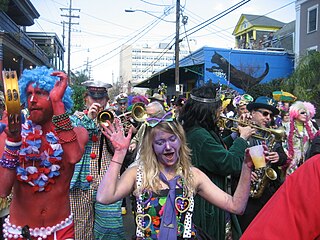
Mardi Gras is the final day of Carnival ; it thus falls on the day before the beginning of Lent on Ash Wednesday. Mardi Gras is French for "Fat Tuesday", reflecting the practice of the last night of consuming rich, fatty foods in preparation for the Christian fasting season of Lent, during which the consumption of such foods is avoided.

Carnival or Shrovetide is a festive season that occurs at the close of the Christian pre-Lenten period, consisting of Quinquagesima or Shrove Sunday, Shrove Monday, and Shrove Tuesday or Mardi Gras.

Shrove Tuesday is the final day of Shrovetide, marking the end of pre-Lent. Lent begins the following day with Ash Wednesday. Shrove Tuesday is observed in many Christian countries through participating in confession; the ritual burning of the previous year's Holy Week palms; finalizing one's Lenten sacrifice; as well as eating pancakes and other sweets.

The Haxey Hood is a traditional event in Haxey, North Lincolnshire, England. It consists of a game in which a large football scrum pushes a leather tube to one of four pubs in the town, where it remains until the following year's game. The game is played on 6 January, the Twelfth Day of Christmas.

Chester-le-Street is a market town in the County Durham district, in the ceremonial county of Durham, England. It is located around 6 miles north of Durham and is also close to Newcastle upon Tyne. The town holds markets on Tuesdays, Fridays and Saturdays. In 2011, it had a population of 24,227.

Sedgefield is a market town and civil parish in County Durham, England. It had a population of 5,211 as at the 2011 census. It has the only operating racecourse in County Durham.

The Royal Shrovetide Football Match is a "medieval football" game played annually on Shrove Tuesday and Ash Wednesday in the town of Ashbourne in Derbyshire, England. Shrovetide ball games have been played in England since at least the 12th century from the reign of Henry II (1154–89). The Ashbourne game also known as "hugball" has been played from at least c.1667 although the exact origins of the game are unknown due to a fire at the Royal Shrovetide Committee office in the 1890s which destroyed the earliest records. One of the most popular origin theories suggests the macabre notion that the 'ball' was originally a severed head tossed into the waiting crowd following an execution. Although this may have happened, it is more likely that games such as the Winchelsea Streete Game, reputedly played during the Hundred Years' War with France, were adaptations of an original ball game intended to show contempt for the enemy.
Hurling is an outdoor team game played only in Cornwall, England, played with a small silver ball. While the sport shares its name with the Irish game of hurling, the two sports are completely different.
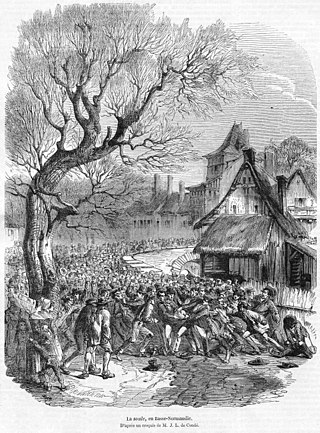
La soule, later choule, is a traditional team sport that originated in Normandy and Picardy. The ball, called a soule, could be solid or hollow and made of either wood or leather. Leather balls would be filled with hay, bran, horse hair or moss. Sometimes the balls had woolen pompons.
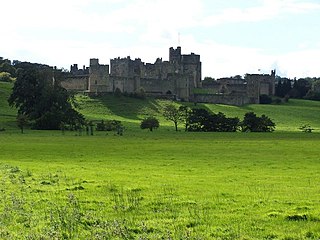
Scoring the Hales is the name of a large scale shrovetide football match played yearly in the English market town of Alnwick, Northumberland. Once a street contest, it has now moved to a field named The Pastures across the River Aln from Alnwick Castle.

Fat Thursday is a Christian tradition in some countries marking the last Thursday before Lent and is associated with the celebration of Carnival. Because Lent is a time of fasting, the days leading up to Ash Wednesday provide the last opportunity for feasting until Easter. Traditionally it is a day dedicated to eating, when people meet in their homes or cafés with their friends and relatives and eat large quantities of sweets, cakes and other meals usually not eaten during Lent. Among the most popular all-national dishes served on that day are pączki in Poland or Berliners, fist-sized donuts filled with rose hip jam, and angel wings (faworki), puff pastry fingers served with powdered sugar.

Medieval football is a modern term used for a wide variety of the localised informal football games which were invented and played in England during the Middle Ages. Alternative names include folk football, mob football and Shrovetide football. These games may be regarded as the ancestors of modern codes of football, and by comparison with later forms of football, the medieval matches were chaotic and had few rules.

Shrove Monday is part of the Shrovetide or Carnival observances and celebrations of the week before Lent, following Quinquagesima or Shrove Sunday and preceding Shrove Tuesday or Mardi Gras.
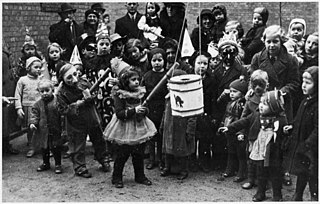
Fastelavn is a Carnival tradition in the Northern European, and historically Lutheran, nations of Denmark, Norway, Sweden, Latvia, Estonia, Iceland, Faroe Islands, as well as Greenland.
Nickanan Night is a Cornish feast, traditionally held during Shrovetide, specifically on Shrove Monday.
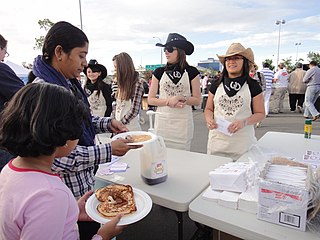
A pancake breakfast is a public meal attached to many festivals, religious celebrations, and community events which involves volunteers cooking large quantities of pancakes and other hot breakfast foods for the general public, often for free or for a nominal charge if the event is a fundraiser.

The Atherstone Ball Game is a "medieval football" game played annually on Shrove Tuesday in the English town of Atherstone, Warwickshire. The game honours a match played between Leicestershire and Warwickshire in 1199, when teams competed for a bag of gold, and which was won by Warwickshire. At one time similar events were held in many towns throughout England, but Atherstone's is now one of at least three such games that are still played each year at Shrovetide, the others being the Royal Shrovetide Football match held in Ashbourne, Derbyshire, and The Alnwick Shrovetide Football Match in Alnwick, Northumberland.

Shrovetide is the Christian liturgical period prior to the start of Lent that begins on Shrove Saturday and ends at the close of Shrove Tuesday. The season focuses on examination of conscience and repentance before the Lenten fast. It includes Shrove Saturday, Shrove Sunday, Shrove Monday and Shrove Tuesday.
References
- ↑ "Delivery driver wins annual Sedgefield ball game". The Northern Echo. 22 February 2012. Retrieved 26 February 2020.
- ↑ "Hundreds join in the fun at the Sedgefield Shrove Tuesday Ball Game". The Northern Echo. Retrieved 26 February 2020.
- ↑ Lines, Chris. "Winner of the 2014 Sedgefield Ball Game". Twitter. Retrieved 26 February 2020.
- ↑ Anderson, Lizzie (18 February 2015). "Shrove Tuesday doesn't only mean pancakes for people of Sedgefield". The Northern Echo.
- ↑ "Sedgefield Shrove Tuesday Ball Game".
- ↑ MacFarlane, Katie (28 February 2017). "Testosterone aplenty as Shrove Tuesday Ball Game proves hit for town". The Northern Echo. Retrieved 26 February 2020.
- ↑ McDermott, Paige (13 February 2018). "33 Pictures: Sedgefield Ball Game 2018". The Northern Echo. Retrieved 26 February 2020.
- ↑ "2019 Ball Game - match report" (PDF). SEDGEFIELD NEWS. Retrieved 26 February 2020.
- ↑ Lines, Chris. "Congratulations to Paul Johnson, winner of the 2020 #Sedgefield Ball Game - a deserving and popular victor. Look what it means to Paul! #PancakeDay #shrovetuesday". Twitter. Retrieved 26 February 2020.
- ↑ "Sedgefield ball game winner gains bragging rights after battling his way to victory". The Northern Echo. 4 March 2022. Retrieved 4 March 2022./